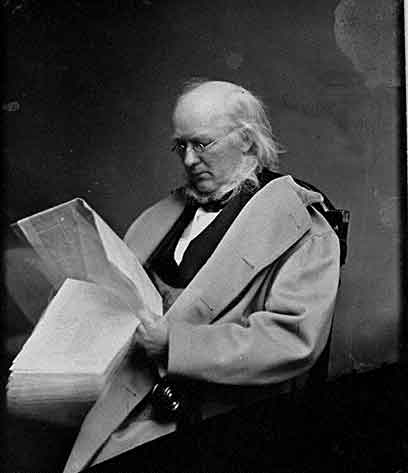Greely, Horace

(1811-1872)
Horace Greeley was born near Amherst, New Hampshire, on February 3, 1811. After a limited amount of schooling, he was apprenticed to Amos Bliss (in 1826), editor of the Northern Spectator at East Poultney, Vermont.
Five years later, Greeley moved to New York, founding the New Yorker with his partner Jonas Winchester. Despite persistent financial difficulties, he felt compelled to pursue his career as a journalist. While editor of the New Yorker, he contributed a number of articles to the Daily Whig.
In addition, he edited Whig campaign weeklies in 1838 (the Jeffersonian) and 1840 (the Log Cabin). Then, in the following year, he established the New York Tribune, a daily Whig newspaper which he edited until his death.
A zealous reformer, Greeley used the Tribune as a vehicle to express his views. He opposed slavery most vigorously, and supported free homesteading: "Go West, young man," he was popularly quoted as advising, "and grow up with the country." In addition, he encouraged the organization of labor.
During the Civil War, he found it difficult to maintain a consistent political view. Although, he supported emancipation, he was not willing to commit to war. And after the war, he encouraged total amnesty for former rebels, yet supported the Radicals‚ program of Reconstruction--especially the Fourteenth and Fifteenth amendments.
In 1872, Greeley made a final bid for office, accepting the presidential nominations of the Liberal Republican and Democratic parties. He was overwhelmingly defeated, however, by President Ulysses S. Grant. On November 29, 1872--less than a month after the election--Greeley died in Pleasantville, New York.
Horace Greeley was born near Amherst, New Hampshire, on February 3, 1811. After a limited amount of schooling, he was apprenticed to Amos Bliss (in 1826), editor of the Northern Spectator at East Poultney, Vermont.
Five years later, Greeley moved to New York, founding the New Yorker with his partner Jonas Winchester. Despite persistent financial difficulties, he felt compelled to pursue his career as a journalist. While editor of the New Yorker, he contributed a number of articles to the Daily Whig.
In addition, he edited Whig campaign weeklies in 1838 (the Jeffersonian) and 1840 (the Log Cabin). Then, in the following year, he established the New York Tribune, a daily Whig newspaper which he edited until his death.
A zealous reformer, Greeley used the Tribune as a vehicle to express his views. He opposed slavery most vigorously, and supported free homesteading: "Go West, young man," he was popularly quoted as advising, "and grow up with the country." In addition, he encouraged the organization of labor.
During the Civil War, he found it difficult to maintain a consistent political view. Although, he supported emancipation, he was not willing to commit to war. And after the war, he encouraged total amnesty for former rebels, yet supported the Radicals‚ program of Reconstruction--especially the Fourteenth and Fifteenth amendments.
In 1872, Greeley made a final bid for office, accepting the presidential nominations of the Liberal Republican and Democratic parties. He was overwhelmingly defeated, however, by President Ulysses S. Grant. On November 29, 1872--less than a month after the election--Greeley died in Pleasantville, New York.
 >
>